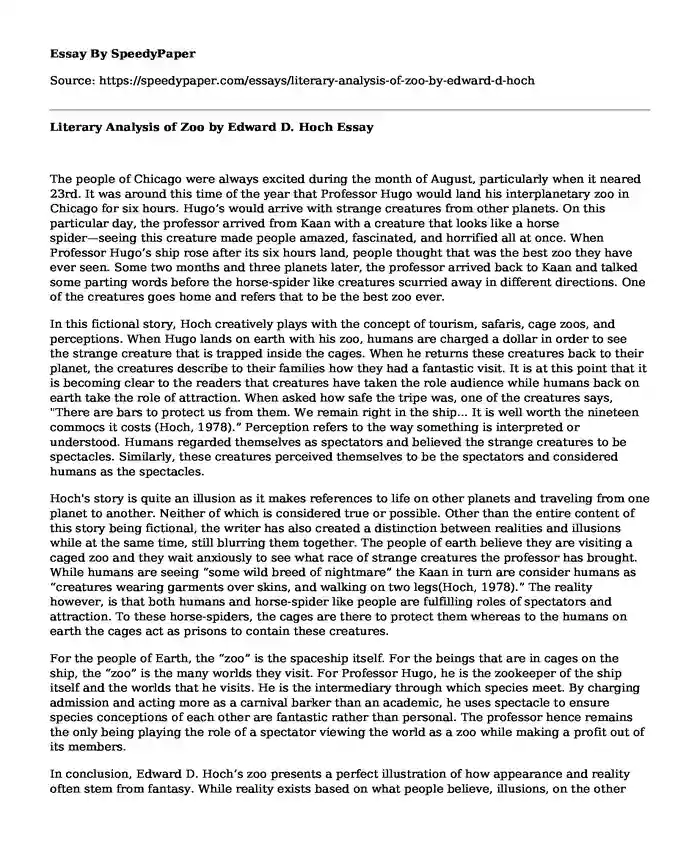
| Type of paper: | Essay |
| Categories: | Fiction Literature review |
| Pages: | 3 |
| Wordcount: | 673 words |
The people of Chicago were always excited during the month of August, particularly when it neared 23rd. It was around this time of the year that Professor Hugo would land his interplanetary zoo in Chicago for six hours. Hugo’s would arrive with strange creatures from other planets. On this particular day, the professor arrived from Kaan with a creature that looks like a horse spider—seeing this creature made people amazed, fascinated, and horrified all at once. When Professor Hugo’s ship rose after its six hours land, people thought that was the best zoo they have ever seen. Some two months and three planets later, the professor arrived back to Kaan and talked some parting words before the horse-spider like creatures scurried away in different directions. One of the creatures goes home and refers that to be the best zoo ever.
In this fictional story, Hoch creatively plays with the concept of tourism, safaris, cage zoos, and perceptions. When Hugo lands on earth with his zoo, humans are charged a dollar in order to see the strange creature that is trapped inside the cages. When he returns these creatures back to their planet, the creatures describe to their families how they had a fantastic visit. It is at this point that it is becoming clear to the readers that creatures have taken the role audience while humans back on earth take the role of attraction. When asked how safe the tripe was, one of the creatures says, "There are bars to protect us from them. We remain right in the ship... It is well worth the nineteen commocs it costs (Hoch, 1978).” Perception refers to the way something is interpreted or understood. Humans regarded themselves as spectators and believed the strange creatures to be spectacles. Similarly, these creatures perceived themselves to be the spectators and considered humans as the spectacles.
Hoch's story is quite an illusion as it makes references to life on other planets and traveling from one planet to another. Neither of which is considered true or possible. Other than the entire content of this story being fictional, the writer has also created a distinction between realities and illusions while at the same time, still blurring them together. The people of earth believe they are visiting a caged zoo and they wait anxiously to see what race of strange creatures the professor has brought. While humans are seeing “some wild breed of nightmare” the Kaan in turn are consider humans as “creatures wearing garments over skins, and walking on two legs(Hoch, 1978).” The reality however, is that both humans and horse-spider like people are fulfilling roles of spectators and attraction. To these horse-spiders, the cages are there to protect them whereas to the humans on earth the cages act as prisons to contain these creatures.
For the people of Earth, the “zoo” is the spaceship itself. For the beings that are in cages on the ship, the “zoo” is the many worlds they visit. For Professor Hugo, he is the zookeeper of the ship itself and the worlds that he visits. He is the intermediary through which species meet. By charging admission and acting more as a carnival barker than an academic, he uses spectacle to ensure species conceptions of each other are fantastic rather than personal. The professor hence remains the only being playing the role of a spectator viewing the world as a zoo while making a profit out of its members.
In conclusion, Edward D. Hoch’s zoo presents a perfect illustration of how appearance and reality often stem from fantasy. While reality exists based on what people believe, illusions, on the other hand, is based on what people think subjectively of the situations they are facing. In the same way, good cannot exist without bad, illusions do not just create realities, but they also help to separate reality and illusion.
Reference
Hoch, E. D. (1978). Zoo. Asimov, I., Greenberg, MH, and Olander, JD, editors, 100.
Cite this page
Literary Analysis of Zoo by Edward D. Hoch. (2023, Dec 16). Retrieved from https://speedypaper.net/essays/literary-analysis-of-zoo-by-edward-d-hoch
Request Removal
If you are the original author of this essay and no longer wish to have it published on the SpeedyPaper website, please click below to request its removal:
- Free Paper: Better Resources Management for Quality of Service Issues for Video Traffic
- Free Essay Example: Win an Inn
- Free Essay Sample on John Donne's Poetry
- Leaves of Grass, Free Essay about Walt Whitman Works
- Essay Sample Expanding a Colleague's Position on Writing a Literature Review
- Essay Sample on The Heroism of Beowulf
- Essay Sample on Website Comparison and Contrast Between NJOTA and AOTA
Popular categories




